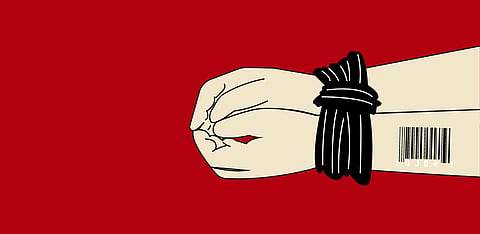

Survivor groups met in Kolkata last week to evolve a campaign in time for seeking the passage of the pending Trafficking in Persons (Prevention, Care and Rehabilitation) Bill, 2021, in the ensuing monsoon session of Parliament.
—–
With the monsoon session of Parliament set to start, the conversation around the Trafficking in Persons (Prevention, Care and Rehabilitation) Bill 2021 has resumed. Last week saw a meeting in Kolkata of prominent survivor groups. It was led by the Indian Leadership Forum Against Trafficking (ILFAT) and discussed issues in the fight against human trafficking in India.
As the Bill is likely to be introduced in the session, members of ILFAT are planning to meet legislators to press urgently for the passing of the Bill in both the Houses. The survivors of trafficking hold hope that the Bill will soon pass into law and alleviate some of their struggles.
Also read: Flipside of new human trafficking Bill
The 2021 Bill is an improved version of the Trafficking of Persons (Prevention, Protection and Rehabilitation) Bill, 2018 that was passed by the Lok Sabha in July 2018. However, the Bill was not taken up in the Rajya Sabha and it subsequently lapsed in 2019, due to the general elections that year.
Currently, trafficking in India is covered under multiple laws including Article 23(1) of the Constitution, S. 370 and 370A of the IPC, the Immoral Traffic (Prevention) Act 1956, and by provisions under other laws relating to protection of women and children. The National Crime Records Bureau reported a total of 1714 cases of human trafficking in 2020 and identified 4709 persons as victims.
But the data is at odds with the experiences of activists on the ground. It is alleged that the actual number of trafficked persons could be in the millions. Even when cases are reported, less than 10% actually end in convictions, according to the NCRB. This is why survivors and experts are pushing for a comprehensive law against trafficking. They are hoping that this will lead to more arrests of traffickers and a crackdown on trafficking rings.
The Draft Trafficking in Persons (Prevention, Care and Rehabilitation) Bill was published in June 2021 by the Ministry of Women and Child Development. The Bill was introduced as a comprehensive law to fight human trafficking for exploitation; sexual or physical. It improved upon the 2018 Bill by widening the scope of 'victims' to include transgenders and other persons while also extending its reach to cover offences with cross border implications. It also put forth specific mechanisms for prevention and rehabilitation.
The new Bill expanded the range of offenders by bringing public servants, armed force personnel or others in a position of authority under it. The Bill followed the trend of the 2018 Bill in recommending severe penalties for aggravated offences. Aggravated trafficking is set to be punished with rigorous imprisonment of 10 years to life imprisonment along with a fine of up to Rs.10 lakh.
In case of the victim's death, the penalty is life imprisonment and fine of Rs.30 lakh. A second conviction, in case the victim is a child, may invite death sentence or rigorous imprisonment for the remainder of the accused's natural life and fine of up to Rs.30 lakh or such other fine as is provided for that offence under any other law, for the time being in force, whichever is higher. It further specifies that the investigation should be completed within 90 days of the arrest of the accused.
While the measures put forth by the Bill are a great step forward, survivors say that it has left major gaps. The ILFAT, set up in 2019 by survivors, has urged the government to consider relief measures beyond shelter homes. ILFAT represents 13 collectives of over 4000 survivors spread across multiple states. They are asking for community-based rehabilitation models that will allow survivors to reintegrate into their communities easily. They also advocate for greater agency for survivors during the rehabilitation process.
Survivors have urged the government to earmark funds for inter-state investigations and Anti Human Trafficking Units. ILFAT has previously engaged with law and policy makers on multiple occasions to raise the issue and to put forth their views on the Bill.
Last week's workshop in Kolkata saw participation from 24 survivor leaders from 10 states to discuss the proposed Bill as well as measures to further their work. The workshop saw discussions on challenges faced by organisations due to the pandemic. They spoke on the ways the pandemic has exposed trafficking, particularly among migrant labourers. A discussion was also held regarding registering ILFAT as a legal entity. This would facilitate greater engagement with individuals, governments, and organisations like Niti Ayog, it was felt.
ILFAT and partner organisations have been regularly engaging in capacity-building activities to empower survivors of trafficking. They also hold sensitisation workshops in the hope of preventing trafficking. These organisations have been slowly building an inter state network of cooperation to fight human trafficking.